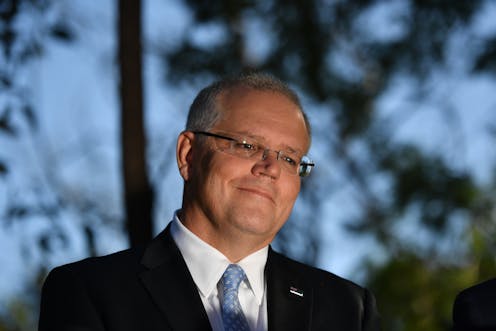Another day, another rorts scandal – this time with car parks. How can we fix the system?
- Written by Yee-Fui Ng, Senior Lecturer, Faculty of Law, Monash University

Yet another rorts scandal is swirling around the federal government. The Auditor-General has reported that a $389 million car park construction fund has been administered ineffectively. The minister had distributed the grants with “inadequate assessment” for eligibility.
The auditor-general’s report found 77% of the commuter car park sites selected were in Coalition electorates, rather than in areas of real need with congestion issues.
Damningly, none of the 47 project sites selected for funding commitment were proposed by the department. This suggests there has been extensive ministerial interference in the funding decision-making.
The fact this questionable allocation of funding occurred the day before Prime Minister Scott Morrison called the 2019 federal election suggests an element of “pork barrelling”: the channelling of public funds to government electorates for political purposes, rather than proper allocation according to merit.
Read more: The 'sports rorts' affair shows the need for a proper federal ICAC – with teeth
What is the history of rorts in Australia?
The car park rorts is the latest in a series of rorts scandals in recent years. This includes the “sports rorts” scandal, in which the biased distribution of funds and a conflict of interest prompted the resignation of minister Bridget McKenzie.
Home Affairs Minister Peter Dutton was also accused of reducing funding to the highest ranked community safety projects and redirecting the funding to projects of his choice, including those not recommended by his department.
At the state level, NSW Premier Gladys Berejiklian was accused of pork-barrelling with the Stronger Communities fund, as she approved $252 million funding before the state election, with 95% of funds going to Coalition electorates.
Rorting isn’t new in Australian politics. More than a decade ago, we had a previous “sports rorts” incident under the Labor Government, in which grants were distributed in favour of the Labor Party. Famously, minister Ros Kelly claimed that decisions on short-listed applications were made on a “great big whiteboard” that was erased without permanent record.
A number of empirical studies over the years have confirmed a strong partisan component to allocating grant money towards the party in power.
Why all the rorts?
Given we have had so many rorts scandals over the years, the question is why they are still happening unabated? Why hasn’t the problem been fixed?
To answer this question, it is necessary to understand the legal and political regulation of grant programs in Australia.
First, the political regulation of grant programs is generally working well. The auditor-general, an independent officer of parliament, has been vigilant in reporting on maladministration of grants in government. Many of the rorts scandals have been brought to light through auditor-general reports.
Parliamentary committees have also been vigilant in investigating grants rorts, and reporting on these incidents.
Sometimes the relevant minister resigns, sometimes they tough it out, depending on the political circumstances and the support of the prime minister or premier.
However, the legal regulation of grant programs is problematic.
Although at the federal level we have sophisticated financial management legislation that provides a framework for grant rules, there are significant loopholes in it.
For one, the government cannot make grant rules for government statutory corporations, or for grants administered under intergovernmental agreements with the states. This is problematic because many grants programs are administered by independent statutory corporations or through the states.
As I have written, there are good reasons to set up independent statutory bodies to administer government policies, rather than leave it to the politicians. This would avoid the partisan interference and short-termism that characterises modern politics. An example of the benefits of this is letting the Reserve Bank set interest rates, rather than politicians.
However, these goals are undermined if ministers interfere with the merit-based decisions of the independent bodies in favour of partisan considerations.
Another issue is that breaches of these grant rules do not result in any legal penalty. There is no penalty for breaching the Commonwealth grant rules in the financial management legislation. So there are no repercussions for breaching the rules, which may be why politicians do it with impunity.
A further problem is the limited opportunity for grant applicants to challenge partisan decisions. Courts in judicial review will confine themselves to the legality of the decisions. They will not intrude into public policy considerations by ministers, such as which applicants deserve the grants.
Read more: Remembrance of rorts past: why the McKenzie scandal might not count for a hill of beans
How can we fix the system?
In light of the pervasive and repeated rorts scandals that have plagued Australian politics, it is time to reform the rules.
First, the loopholes need to be closed. The Commonwealth grant rules provide a detailed set of guidelines that ministers and government officials must follow on grant application and selection processes. This should be broadened to include situations where the Commonwealth distributes grants through an independent statutory corporation or through the states.
Second, there needs to be legal enforcement of the grant rules. This may lead to more effective legal challenges of partisan grant decisions in the courts.
With no legal repercussions for breaches, politicians will continue to flout the rules.
It is clear the probity of the use of public funds is essential to maintaining public trust in the Australian political system. The repeated rorts scandals in Australia undermines a basic tenet of our democracy: that allocation of public money should be administered responsibly by our elected officials.
We need to reform the regulation of grant programs in Australia to enhance the probity, transparency and integrity of the use of public funds.
Authors: Yee-Fui Ng, Senior Lecturer, Faculty of Law, Monash University




